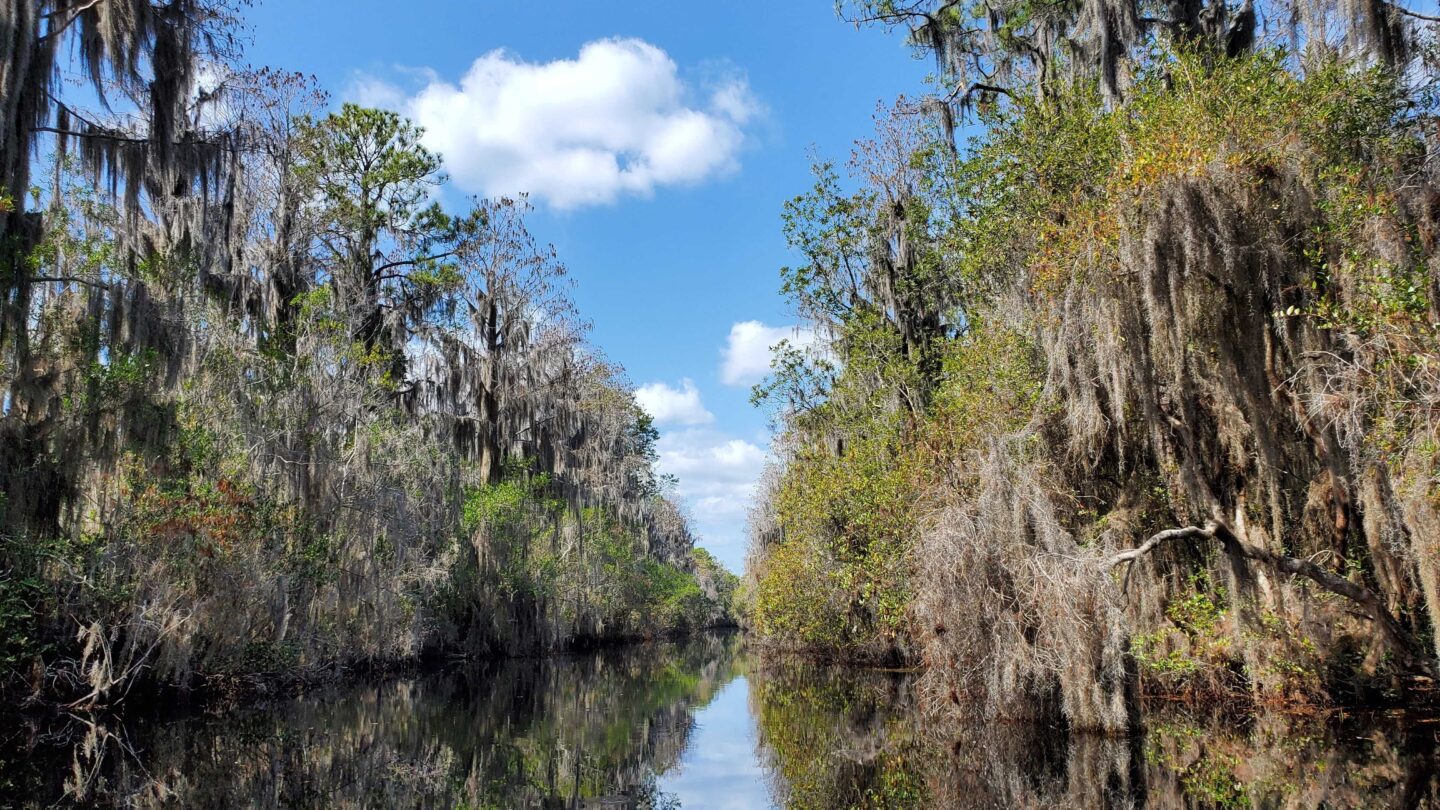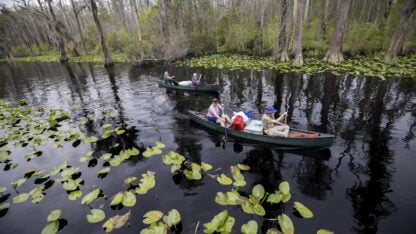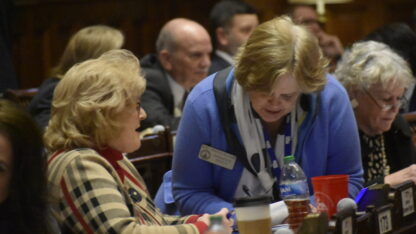This coverage is made possible through a partnership between WABE and Grist, a nonprofit, independent media organization dedicated to telling stories of climate solutions and a just future.
Public commenters spoke out overwhelmingly against a plan to mine for minerals near the Okefenokee National Wildlife Refuge in Southeast Georgia during a pair of public meetings this week. It’s part of an ongoing outcry against the mine from scientists, lawmakers and members of the public that has continued since the plan was first proposed in 2019.
In more than three and a half hours of public comment Thursday night, just one person – a representative of the Georgia Mining Association – spoke in favor of the proposed mine. A similar meeting Tuesday also saw commenters weigh in overwhelmingly against the mine.
“Please don’t let them mine what God has put for us here to enjoy, and generations beyond us,” Sheila Carter, a former Okefenokee guide whose family has worked as guides there for generations, said to state regulators during the Zoom held Thursday hearing.
The Georgia Department of Natural Resources’ Environmental Protection Division is accepting public comment through March 20 on the draft Mining Land Use Plan (MLUP) for the proposed mine, which is roughly three miles from the Okefenokee National Wildlife Refuge. The land use plan, a precursor to state permitting, is designed to determine if mining is appropriate on the site.
More than 70 people spoke against the mine Thursday, ranging from state representatives to high school students. Many echoed the concerns scientists have raised from the beginning – that mining could change the water level in the Okefenokee, which would harm the swamp. Others spoke about their personal connections to the swamp and its importance as a habitat and as a wilderness destination.
“There are some things that are just not worth risking, and this is one of those things,” said Jack Spalding of the Georgia River Network.
Oversight of the swamp
Typically, a project like this would require a federal environmental review from the Army Corps of Engineers. That process began in 2019.
But a short-lived Trump-era interpretation of the Clean Water Act took the property where the mine would be located out of federal jurisdiction and prompted the Corps to step away. Although that rule is no longer in place for new projects, it meant this mine only needs state, not federal oversight – and the power to approve or deny the mine falls to the state EPD.
The land use plan is a step toward getting state-issued permits. According to state law and EPD guidance, the MLUP has to be “consistent with the land use in the area of the mine.”
Mining company Twin Pines Minerals contends it is consistent land use, citing a letter from the administrator of Charlton County, where the mine would be located. The letter, sent in 2020, says no zoning prohibits the mine and points to a county commission resolution passed in 2019 supporting it.
But many public commenters were not convinced. They pointed out that the land surrounding the mine is used primarily for wildlife refuge or for timber growth and harvesting. They worried the mine could harm both by lowering the groundwater level, depriving the swamp and timber farmers of water, and increasing the risk of wildfire.
Courtney Reich of the Georgia Conservancy pointed to the comprehensive plan the county adopted in 2020, which recognizes the conservation lands in the Okefenokee as a priority.
“Protection of this important resource and support for the ecotourism industry features heavily in the plan and its stated goals,” Reich said. “Permitting a mine which puts this refuge at risk is in direct conflict with the comprehensive plan.”
Scientists object – again
Prior to this week’s meetings, a group of 11 scientists sent a letter to EPD criticizing a key piece of the monitoring plan for the proposed mine.
From the beginning, a critical question has been the impact mining would have on the water levels in the swamp, so monitoring those water levels is central to tracking the mine’s impact. But, the scientists contend, EPD chose the wrong US Geological Survey gage for that monitoring.
The group, all hydrologists at southeastern US universities, point to a USGS gage close to the mine that they say “is ideal for analyzing potential effects to swamp hydrology” from the proposed mine.
Instead, EPD is proposing to use a gage further downstream, where the hydrologists say water flowing from a much larger area would “mask the effects” of the mine.
This letter is only the most recent objection from scientists.
Rhett Jackson, a UGA professor and the letter’s lead author, has sent repeated memos to EPD raising concerns about the gage issue and the possible hydrologic impacts of the mine. And in November 2021, more than 40 scientists signed an open letter opposing the mine.
At the time, Twin Pines President Steve Ingle called that letter “hysteria and not an educated perspective” in a statement. He pointed to the company’s own modeling showing limited impacts from mining, which many advocates have dismissed as unreliable because the company funded it.
Frustration at the Statehouse
Some 300 miles away in Atlanta, state lawmakers have mounted their own effort to block mining near the Okefenokee – but they’ve been frustrated by the result.
The Okefenokee Protection Act, introduced last month by Republican Rep. Darlene Taylor and signed by a bipartisan group of more than 30 lawmakers, would not affect the current mine proposal because the permitting process is already underway. But it would block future mining on Trail Ridge, the geological feature where the mine would be located, including any expansions of the current mine footprint.
Twin Pines has made clear the current proposal is a demonstration project the company plans to expand on in the future.
The bill has yet to receive a hearing. A similar bill introduced last year failed to get out of committee.
Some of its backers, frustrated, took the step of attending EPD’s public meeting on Thursday to voice their opposition to the mine and plead for public support for a hearing in the legislature.
In an email Friday, an assistant for the committee’s chair, Republican Rep. Lynn Smith, said the bill would receive a hearing.









